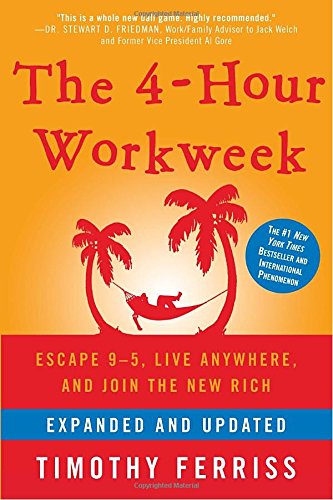Power and Peace: The unexpected results of my first experience with The 4-Hour Workweek
/This post may contain affiliate links. Learn more by reading my disclosure.
The previous weekend, my girlfriend and I listened to an audio book of The 4-Hour Workweek by Tim Ferriss. I’d seen the title when browsing my favorite book stores but always brushed it off as some sort of hokum.
I’d read a recent Twitter reference that Mr. Money Mustache had appeared on Tim Ferriss’ podcast. I listened to that podcast and expressed to my girlfriend how much I enjoyed the episode.
She checked out The 4-Hour Workweek audio book from the library for a weekend getaway and we listened to it on the return leg of the trip. She also checked out Tools of Titans by Ferriss and was really excited by that book.
We rode most of the seven-hour drive in silence as we listened to the book. We paused the narrative occasionally to discuss relevant points. I love talking with my girlfriend, but it was one of the most enjoyable trips ever as we shared the new knowledge together.
When we returned home, we ordered The 4-Hour Workweek (using an Amazon gift card we’d received at Christmas). It felt that important that we wanted to own a physical copy.
After listening to the audio version, I’ve implemented three changes this week in an effort to improve efficiencies in my life.
Low Information Diet
The first recommendation was to try the low information diet. Ferriss recommended cutting out all non-important information in my life that I’d been plugging into it. He specifically called out reading multiple newspapers in the morning.
I’ve always taken pride that I wake up early to read three newspapers daily: The Spokesman-Review, The Wall Street Journal and The Washington-Post. I’ve always thought it was important to make me a well-rounded human and to give me an edge in business.
Do you know how often I use any of the information I read with clients? Rarely.
How often do those articles, whether local or national, make me money? Never.
Do any of those articles affect me? Yes. Whether they are about financial or political issues, military actions or social situations, some stories stay with me throughout each day. Usually, they are not positive, which means I carry around the negative thoughts and feelings of those stories.
After work I watch the PBS News Hour every night and Washington Week on Friday. My favorite Sunday morning pleasure was watching Meet The Press.
On Twitter, I follow various reporters from the Post, the Journal and the Spokesman. I also follow reporters from various other news agencies.
What I realized about myself was I’m a news glutton and I need to go on an immediate diet.
On Monday morning, I woke up and ignored my three newspapers. Instead, I worked for two uninterrupted hours on a new novel. Two hours! During the week no-less! My brain felt hyper-creative for the rest of the day.
The same thing happened every day for the rest of the week. Creativity every morning led to better feelings at work which led to higher output in every aspect of my life.
Had my news diet really put so much fat in my brain and soul that I could no longer see straight?
I “unfollowed” all of the various reporters and news accounts on Twitter. It wasn’t helping me to achieve my goals and, in fact, was doing quite the opposite. It was clogging my day.
I haven’t cancelled my newspaper subscriptions yet, but I’m definitely leaning in that direction. This has been an amazing week for cleansing my brain and I can’t believe the results this little tweak had on my behavior.
Oh, one final thing to admit. This one is a bit embarrassing. Tim did say to limit television viewing to one hour a night. I’d gotten a bit sloppy recently and had taken my viewing up to several hours a night. I set only one hour of Netflix for myself as a reward and actually skipped TV twice this week.
Batching
This was an interesting concept. Tim talked about combining similar tasks together and focusing on them one at a time, not interrupting the process. This keeps your mind in the right place and allows you to get done quicker.
The main discussion was about email, but this is a larger topic which applies to many areas in life.
The first realization came to me when I went by my P.O. box to get the mail. I handle the management for the properties I’m a partner in and it was near the first of the month. Normally, I go by every day to check for the first ten days of the month until all rents are in. Why? I thought. The bills will get paid since there’s plenty of funds in each account. Besides, the checks are secured in the P.O. box. If I go by on a set day once a week, I’ve just saved myself 30 minutes a day times 4 days or 2 hours per week.
You may say it’s an obvious way to save time, but why didn’t I see it before? Who knows? I fell into a routine and before you know it, I’m going by the mailbox for ten days in a row at the start of every month. It doesn’t make sense. I immediately made that change and have recovered 30 minutes every morning this week after my first visit to the mailbox. I’ll also avoid going more than necessary in mid-month just to collect bills.
I also started batching tasks at work. Calls, emails and lease reviews are all batched now. It’s amazing how much more productive I became when I lumped similar tasks together.
I’ve found a lot of time in my day now and am excited about using the batching concept in all areas of my life.
Limiting Email Time
The major change I implemented was limiting the time I allow email to come into my life. I now accept email only between the hours of 10-11 A.M. and 3-4 P.M. I feared this might have a major impact on my business as a commercial realtor, but I was desperate to try it as I feel that I’m a slave to my email, both in the office and on the phone.
On Sunday night, I prepared for the week by turning off the email alerts from Outlook and setting the program to “work offline” before shutting down my computer. The next morning when I powered my laptop on, my email was quiet. It was amazing. My head was clear and I was able to focus on some immediate tasks.
When working on a couple projects, I was still able to compose a couple of emails and drop them in to the “outbox.” They just didn’t go anywhere since Outlook was going to remain offline until 10 A.M.
When the appropriate time rolled around, I turned Outlook “online” and let the emails flood in. However, a new feeling was inside me. I felt in control when greeting my inbox. I powered through the emails quickly, often answering them with one sentence responses. It dawned on me how we now use email for simple correspondence. Is this what it was intended for?
I was mildly surprised at how much email maintenance I do on a daily basis. As a commercial real estate broker, I am deluged with new property listings from brokers around the nation. Most of theses I open and spend time looking through to check various aspects. However, does it really help me on a daily basis? No. It’s a gigantic time suck. So, following Tim’s suggestion I used the “rules” available to me through Outlook and just moved the various emails into different folders. The emails will still be there if I want to check them at a later time (batching, as mentioned above) or if I decide I don’t want them I can easily delete them.
The best part was realizing how quickly I can actually address my email. Both the morning and afternoon batches were answered in 30 minutes. I looked at the clock when I finished. How was that possible? I used to feel overwhelmed at the demands that flew through email. When aggregated, though, those demands were contained to an hour for a full day.
At the end of both hours, I simply switched my email program back to “work offline” and focused on other business. My head was clear again.
Every day for years, I fought a battle against email with it’s constant chime, ding or visual wave to get my attention to look at it. Whenever that occurred it would break my concentration from whatever I was doing. When in a meeting, I had taken to turning my phone over or leaving it in my jacket pocket. However, in my own office I was a slave to Outlook.
When I explained to my business partner what I was experimenting with, he gave the best description of what I was working to escape. He said, “It’s like mowing your lawn, but you stop after finishing one strip of grass to go inside to wash a dish. Then you go start a load of laundry before returning outside to continue mowing the lawn which leads you to remember that you had another dish to wash, so you stop after another strip of grass to go back inside.”
Wednesday revealed how much emails affect me and possible everyone. While still at home in the early hours (5:30 A.M.) and drinking my first cup of coffee, I grabbed my phone and tapped open the email application. Crud, I thought. I don’t want to do this. I’m on a new system. However, before I could shut it down I saw an email from a client wanting a response. Could it have waited until 10 A.M. to be addressed? Definitely. However, I saw it at 5:30 A.M. and now I was worried about the response.
I closed the program, telling myself I would address the email later. I set about working on my novel and attempted to ignore the email. Unfortunately, I couldn’t. The rest of my morning tranquility was gone. I fretted about the email while trying to write. I worried about it when I got to work. Finally, I made the decision to allow emails through to catch that one email, respond to it and shut it back down. Once I did that, my worry went away and I was back on track. It wasn’t even a bad email. It was just a client needing an answer on a project.
I have basically trained myself in such a Pavlovian way to respond with worry if a client needs something. I’ve talked with a couple others about my test run on the email time limits and they’ve expressed the same thing. We worry and stress over small emails, especially when we can’t get clients what they need immediately. We’ve created this weird expectation of ourselves and are harming our lives in the process. It’s time to take back some control of how we manage our own lives.
At week's end, two benefits emerged: power and peace.
It’s surprising that the feeling of power over my work life has come from such simple changes. I control when the emails get to me now. I’m not ignoring them. In fact, I face them with more attention and ferocity than ever before. I only have one hour to respond so I can’t mess around. I’ve had a couple tough emails to answer and I did it. I want them done and gone. This is the cleanest my Inbox has ever been.
My office is also the most organized it’s been in months. In batching tasks, without the interruption of emails, I can start one task and finish it, before moving on. Or, in the case of a large task that’s faced with a looming interruption, I can clean it up and move it to the side. I’m not a cluttered mess (both literally and figuratively), trying desperately to focus on five or more different tasks at one time.
Peace is the other benefit I’ve experienced this week. The first hint came with the introduction of the information diet. The bad of the world isn’t being pumped into my head every morning. Instead, I can spend 1-2 hours every morning being creative before going into the office.
By batching my tasks, I don’t feel stressed-out by the end of the day when I’m heading to the gym. I used to treat my work-outs as an opportunity to release stress. I’d begin my stretching, trying to clear my mind of the day’s worries. This week, I was at peace before the work-out started and just had fun in the gym.
My business partner noticed a change in my general alertness and my girlfriend noticed a big change in my happiness. When I add how I feel inside there’s no doubt that I’m going to continue these three items as we wait for the book to arrive. I’m looking forward to actually reading The 4-Hour Workweek now and discovering more ways to improve my life.
Are you looking to make a change in your work life? Isn't it time to give The 4-Hour Workweek a read?







